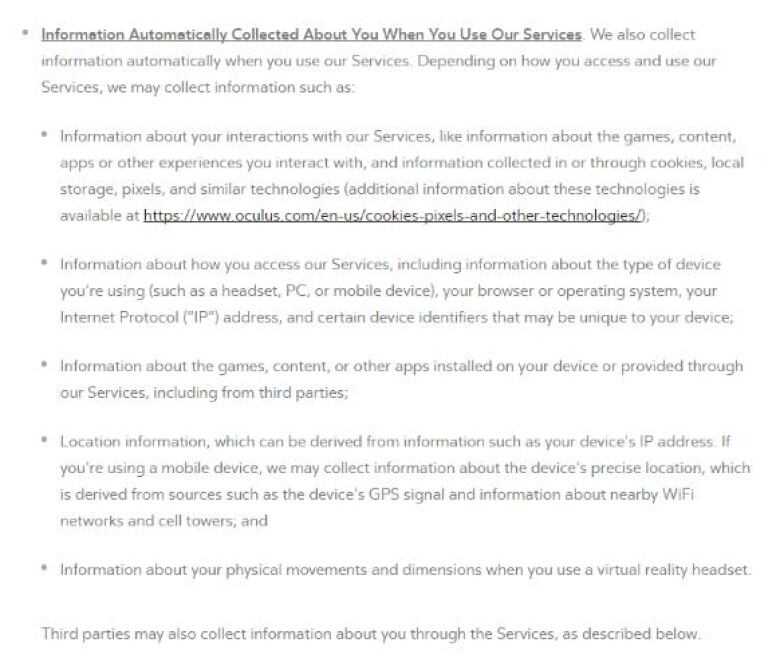Oculus Rift terms of service raise privacy concerns
Users must agree to let Facebook track their physical movements and dimensions, marketing responses

The long-awaitedOculus Rift the virtual reality headset from the company now owned by Facebook is now shipping to customers.
But privacy advocates say the technology could open a big can of worms when it comes to your personal data. CBC Radio technology columnistDan Misener looked into why.
Whatkind of issues have come up withthe Oculus Rift user agreement?
Now thatthese virtual reality headsets have started arriving on the market, people have taken a close look at the terms of service and the privacy policy those long, legal documents that many of us agree to without actually reading.
And within those documents, customers and critics have found language they find troubling. They're pointing out issuesfrom a privacy perspective, in terms of the kinds of data this VR headset collects about users, and also from a content creation perspective.
Some VR designers and developers are uncomfortable with the rights Oculus wants in exchange for using their technology.
So there are some things you should be thinking about before you strap on a virtual reality headset which is something more and more of us are likelygoing to do over the next year or so.
What are the privacy concerns?
If you read the Oculus privacy policy, it outlines the kinds of information the company can collect about you.

But then you get to a section that says Oculus will collect "Information about your physical movements and dimensions when you use a virtual reality headset."
So we're talking about tracking the movement of your body, and then sending that information to Oculus, which is owned by Facebook.
And later on inthe privacy policy, Oculus explains what it can actually dowith this information. Among other things, it explicitly talks about marketing, and using the Oculus Rift "to measure how users respond to our marketing efforts."
Users have discovered that the software you need to run the Oculus rift is configured to run all the time, in the background,reporting back to Facebook.
So to recapwe're talking about a system that's always monitoring, tracking your physical movements, sending that info to Facebook, and using it to tailor marketing messages to you.
What do privacy advocates say about this?
Avner Levin, the Director of the Privacy andCyber Crime Instituteat Ryerson University,says it's still really early days for VR, and there will be uses for this technology we simply haven't imagined yet.
But he says we need to be aware of what we're doing when we agreeto these privacy policies.

"There's a whole other set of categories here that all of a sudden could seem to us to be very intrusive of perhaps some of our most private moments as users of this kind of technology.So this is the kind of thing that people need to worry about."
For instance, some people may be OK with Facebook tracking their body movements during a video game. But they may be less comfortable being tracked if they're watching, say,adult content.
And as Avner points out, pornography is one of the biggest consumer-facing industries using VR right now.
What other concerns do people have with the Oculus terms of service?
Some content creators virtual reality developers and designers have voiced concerns.
If you create something for the Oculus Rift, Oculus says "we do not claim any ownership rights in or to your User Content," according to itsterms of service.
But those terms also state that "By submitting User Content through the Services, you grant Oculus a worldwide, irrevocable, perpetual (i.e. lasting forever), non-exclusive, transferable, royalty-free and fully sublicensable(i.e. we can grant this right to others)right to use, copy, display, store, adapt, publicly perform and distribute such User Content in connection with the Services."
So all kinds of ways Oculus can use the content you create for the device.All without paying you.

Stephan Tanguay isa Canadian VR designer and developer.He said he's seen this kind of language from other VR and gaming companies, too.
"It's usually on the incredibly aggressive scale if you read it, it's veryscary," he said.
"But I think at the end of the day, people want to do what they do for a living. I think people who are making content to be sold understand that [the terms of service are]part of making content to be sold."
Point being, if you make VR content for Oculus and there's a community of people doing this in Canada these terms may not be ideal, but they're part of doing business.
What's the bigger issue here?
It illustrates the fact that a lot of us agree to terms of service without really reading them.
And according to Avner Levin, the myth that we all read and understand the terms of service beforewe click "agree" works well for companies, but not so well for individuals.Legally, he says, it's an agreement.
"But it's not really our agreement in any meaningful way," he said."It's simply taking the ability from usto complain down the line, in legal terms,about these potential uses."
Sobeyond the specifics of the Oculus Rift terms of service, the message here is that we should pay closer attention to the things we agree to online especially if it involves always-onbody-tracking that's hooked up to an ad network.












_(720p).jpg)


 OFFICIAL HD MUSIC VIDEO.jpg)
.jpg)



























































































